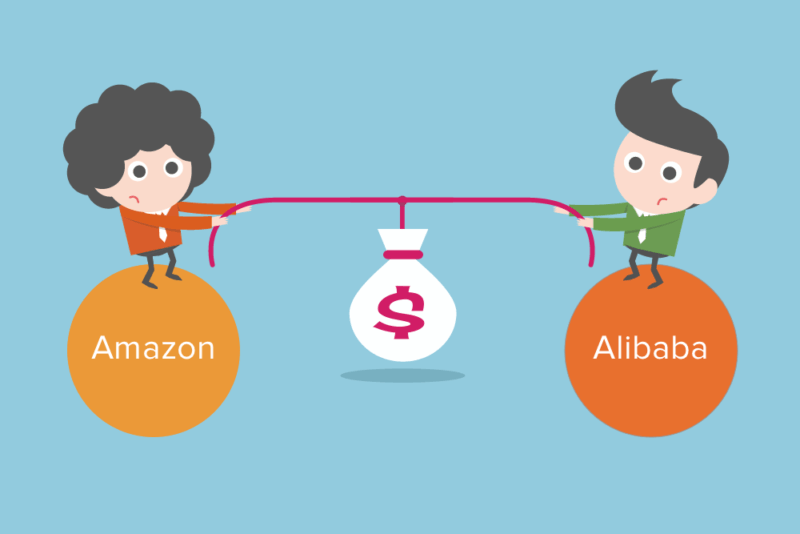Amazon and Alibaba, the two big giants of the ecommerce industry are competing against each other to win the crown for the leader of the global ecommerce market. Amazon laid the cornerstone in 1995 as an online bookstore whereas Alibaba started off its venture in 1999, nearly five years after Amazon’s founding.
Now that both the companies have established a strong brand presence in their home territories, there is tough competition between these two tech giants as they are looking for new markets to expand in.
By raising an IPO value of $21.8 billion by the end of 2014, Alibaba has grown on to become one of the largest and most valuable ecommerce companies in the world. In fact, on the first day of trading, Alibaba eclipsed both Amazon and eBay.
The two ecommerce titans have many features in common. A major portion of Amazon’s revenue comes from electronic products and merchandise and digital media content (including Amazon Prime, an annual fee-based subscription that streams video content and other trending digital services).
On the other hand, Alibaba operates on a number of ecommerce sites aimed at different types of sellers. Alibaba’s Taobao is one of Alibaba group’s most profitable marketplaces and is responsible for more than 80% of Alibaba’s sales. Even though the mode of operation of both companies looks similar at first glance, they are quite different.
Alibaba isn’t involved in direct sales and does not own any warehouses like Amazon. They simply help small businesses and branded manufacturers reach consumers. Amazon operates on a managed online platform that looks similar to a traditional store but stays online. It exercises control over customer experience.
Alibaba looks profitable, but the company is facing strong barriers in finding new customers and adapting to new economies. Amazon has already recognised the fact that to compete with Alibaba in China, they need to invest a huge amount of money to increase sales and has pivoted away from China to focus on other prominent regions.
Alibaba: A Brief History
Remember in 1999 when the whole world seemed to be in a tizzy about Y2K? Well, a group of 18 friends and students, led by Jack Ma, ignored the hype and instead founded Alibaba.com. It originally started as a China-based B2B marketplace that catered to small and big businesses exporting Chinese products globally, becoming profitable just 3 years after being founded.
Since then, Alibaba has steadily and widely grown. Although Jack Ma stepped down as the chairman, he had built a very solid foundation, with Alibaba’s current market value at more than a quarter-trillion USD.
Amazon: A Brief History
Whether you view Jeff Bezos as a mastermind or villain, there’s no denying he’s built up one of the largest and most successful ecommerce marketplaces in the whole world. He got his start 5 years earlier than Jack Ma did when he quit his job as a VP at a Wall Street firm and started drawing up plans for what would eventually be called Amazon.
Although Amazon originally started as an online bookstore, it rapidly expanded to include just about every category imaginable. But Bezos didn’t stop there, also acquiring Twitch, Whole Foods and more than 40 other subsidiaries, with a value of more than $500 billion all in all.
Similarities Between Amazon and Alibaba
On the surface, the two seem to share quite a bit in common. They’re two ecommerce behemoths who enjoy the luxury of very few competitors. While their market shares may be different percentages (Amazon owns 39% of all US ecommerce sales, while Alibaba owns 58.2% of all retail ecommerce shares in China), they each dominate their respective countries in which they began.
Both also have proprietary payment systems: Amazon has Amazon Pay, which allows users to purchase items on non-Amazon sites with their Amazon accounts. Alibaba has done the same with Alipay, with more than 700 million annual active users employing its mobile and online payment system.
However, that’s pretty much where the similarities end. Amazon and Alibaba have very different business models from each other, so let’s jump into what those are so you can see for yourself which would suit you better as an online seller.
Difference 1: Target Audience
Who each online marketplace targets is probably the biggest difference between Amazon and Alibaba. Amazon sells directly to consumers for both new and used items, while Alibaba is a middleman between buyers and sellers.
That’s not to say that Alibaba doesn’t have an Amazon-style offering, as they have both AliExpress and Taobao. The latter, in particular, is their largest and most profitable site, with almost seven million active sellers stocking items on the fee-free marketplace (neither buyers nor sellers have to pay fees) that contribute more than three-quarters of Alibaba’s sales. But their business model is primarily B2B, while Amazon’s is B2C.
Difference 2: Fees
This is another key area where you’ll notice major differences between the two marketplaces. It’s well known that Amazon charges sellers various fees in exchange for being able to list products, whether it’s through the monthly (professional) seller plan, Amazon seller fees, Prime memberships, or many other ways.
Alibaba, on the other hand, doesn’t have quite a tight hold on charging fees, as evidenced by their fee-free Taobao site. It’s not a totally free experience, though, as they generate revenue from sellers paying to rank higher on Taobao’s internal search. Amazon doesn’t charge for this, with SEO and metrics being the top ways sellers rise in search results.
Difference 3: Revenue Sources
Lastly, we come to the third major difference between the two marketplaces: the sources where each company derives its revenue from.
Amazon has a combination of online and offline stores (see: Whole Foods), with their revenue sources coming from big-name brands, individual sellers, subscription services and advertising. They’re also trying to establish dominance in online streaming services — so is Alibaba — but they haven’t yet made the kind of profits that can count as a major source of revenue.
Alibaba has carved out its own niche by getting their revenue from core commerce, digital media, entertainment and funding innovation. Although they, too, are diving into the online streaming world, like Amazon, they haven’t yet built a strong enough foundation to bring in big profits. But we’d bet 10 to one that it’s only a matter of time before they do.
Increase Your Amazon Sales and Profits!
There’s never been a better time to start using an Amazon repricer. Sign up today for a 14-day free trial.



